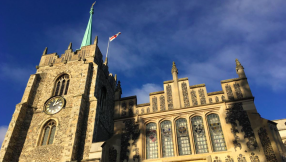
It's a Sunday afternoon, you've just come out of church and you're trying to remember what the preach was about. Something the visiting pastor said really grated with your understanding of the Bible, and the rest of the congregation's.
Ring a bell? Whilst you'll never see a 'were you involved in an accident at church that wasn't your fault?' style advert promising your money or your time back, a lack of theological understanding from our preachers and leaders can have an equally significant impact on our lives.
When Langham Partnership's founder, John Stott, visited churches around the world, he was often surprised at the low quality of preaching that he saw in many of the churches and nations he visited. This, he thought, required the need for a programme to enhance and improve the standard of teaching. How else would church members be equipped to reach out and transform local communities?
And that's the crux of the matter. Having a good understanding of the Bible and being able to explain Jesus' teachings is crucial to building up the church and enabling members to share their faith effectively. The Great Commission is not just for evangelism, but for the advocation of discipleship.
This is not just a problem in majority world nations, but in the UK as well. Since a question on religion was introduced in the UK census in 2001, the number of people identifying as 'Christian' has continuously fallen, with analysts widely predicting that the 2021 results – out later this year – will show a further decrease.
In a similar poll in 2011 which rephrased the question to 'Are you religious?', less than half of those who ticked 'Christian' said that they believed that Jesus Christ was a real person who died, came back to life and was the son of God.
These are the most basic of basic tenets which Christians believe. Whilst church pastors and leaders who responded to this survey may not have been in this minority, is this indicative of a lack of effective teaching of Christian beliefs in the UK?
Building up the global church
Perhaps partially as a result of this, the UK and many other Western nations have become increasingly secular in recent years, leading to the global centre of Christianity moving southwards in terms of population and an increased focus on Christian teaching in non-Western nations.
Church leaders from majority world nations have long been under-represented on the Christian world stage. Many of us have heard of Hillsong, but how many could name an African-based church movement? Ensuring that their theological understanding is strong is equally important to fulfilling the Great Commission, and to making their contextually relevant voices heard globally.
The Langham Scholars programme aims to equip and support aspiring scholars from both minority and majority world nations through theology-based PHDs. Nathan from Sri Lanka for example, is currently studying in Birmingham on his thesis which focuses on theological anthropology in a South Asian Buddhist context.
In Ukraine, one of the graduates supported by Langham Scholars was repairing a dormitory so it could be used as a meeting place for Christians. Then the war started, and the dormitory is now being used to shelter families who are escaping from the war. Over 80 men and women are currently part of the scheme, with graduates now in over 90 countries worldwide.
John Stott once said that "we should be BBC Christians", based on Balanced, Biblical, Christianity. Fulfilling the Great Commission requires deep theological foundations and, more importantly, the equipping of pastors, evangelists and 'ordinary' Christians to create disciples in whatever situation they are in. Some of our graduates have used their PHDs to start NGOs, others have become government advisors for anti-corruption to help build a better society.
The question is, what can we do to encourage our church leaders and preachers to increase their understanding of the Bible, and use it to inspire our churches to make real impacts in our communities?
To find out more about Langham Scholars, visit: https://uk.langham.org/equip-scholars/
Riad Kassis is International Director for the Langham Scholars program of Langham Partnership and the former International Director of the International Council for Evangelical Theological Education (ICETE). Dr Kassis is also a Langham Scholar (PhD, Nottingham, 1997) and serves as a member of the international board for the International Fellowship of Evangelical Students (IFES) and was Associate Professor of Old Testament at Arab Baptist Theological Seminary, Beirut, Lebanon. Riad is from Lebanon where he lives with his wife, Izdihar.













